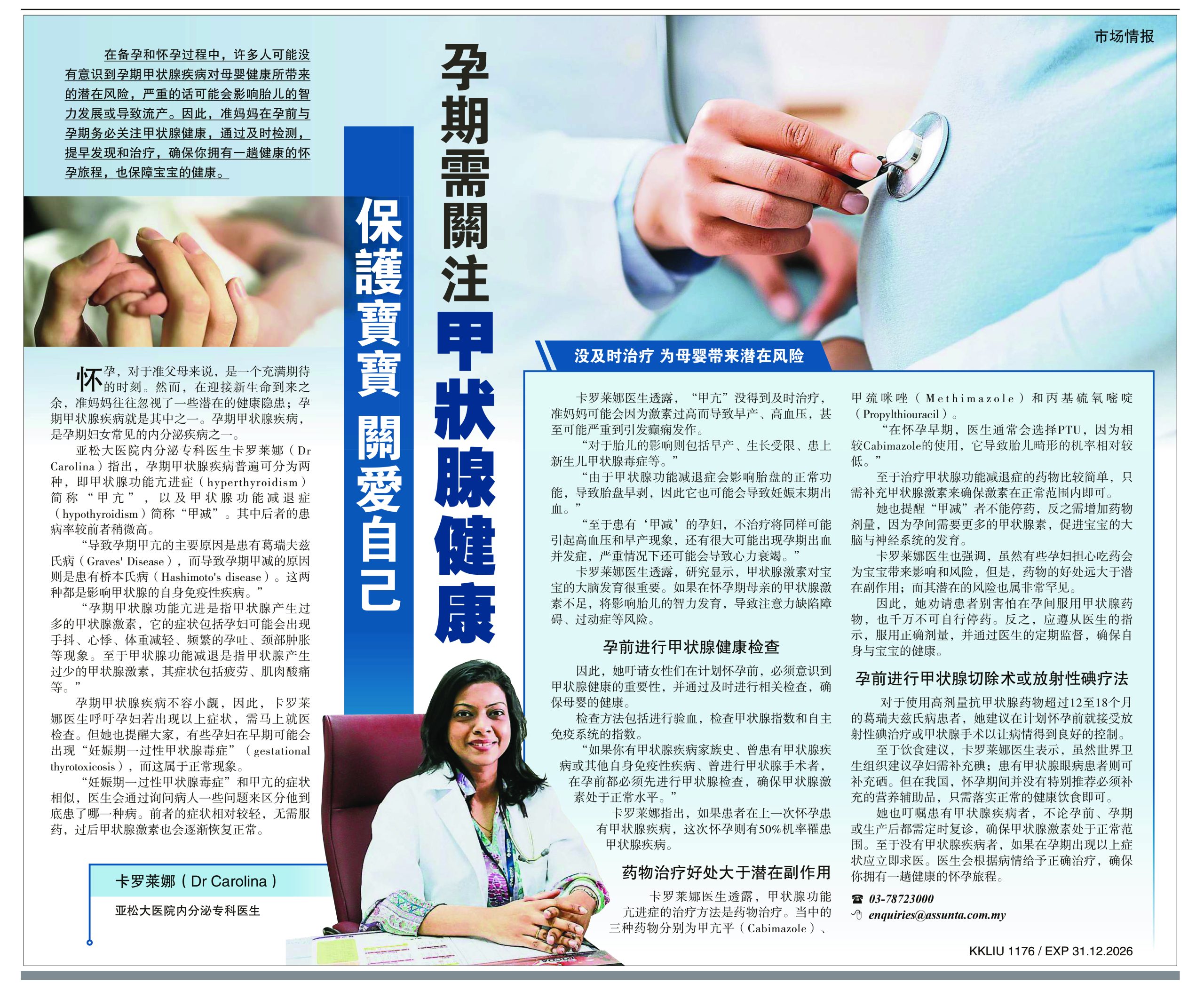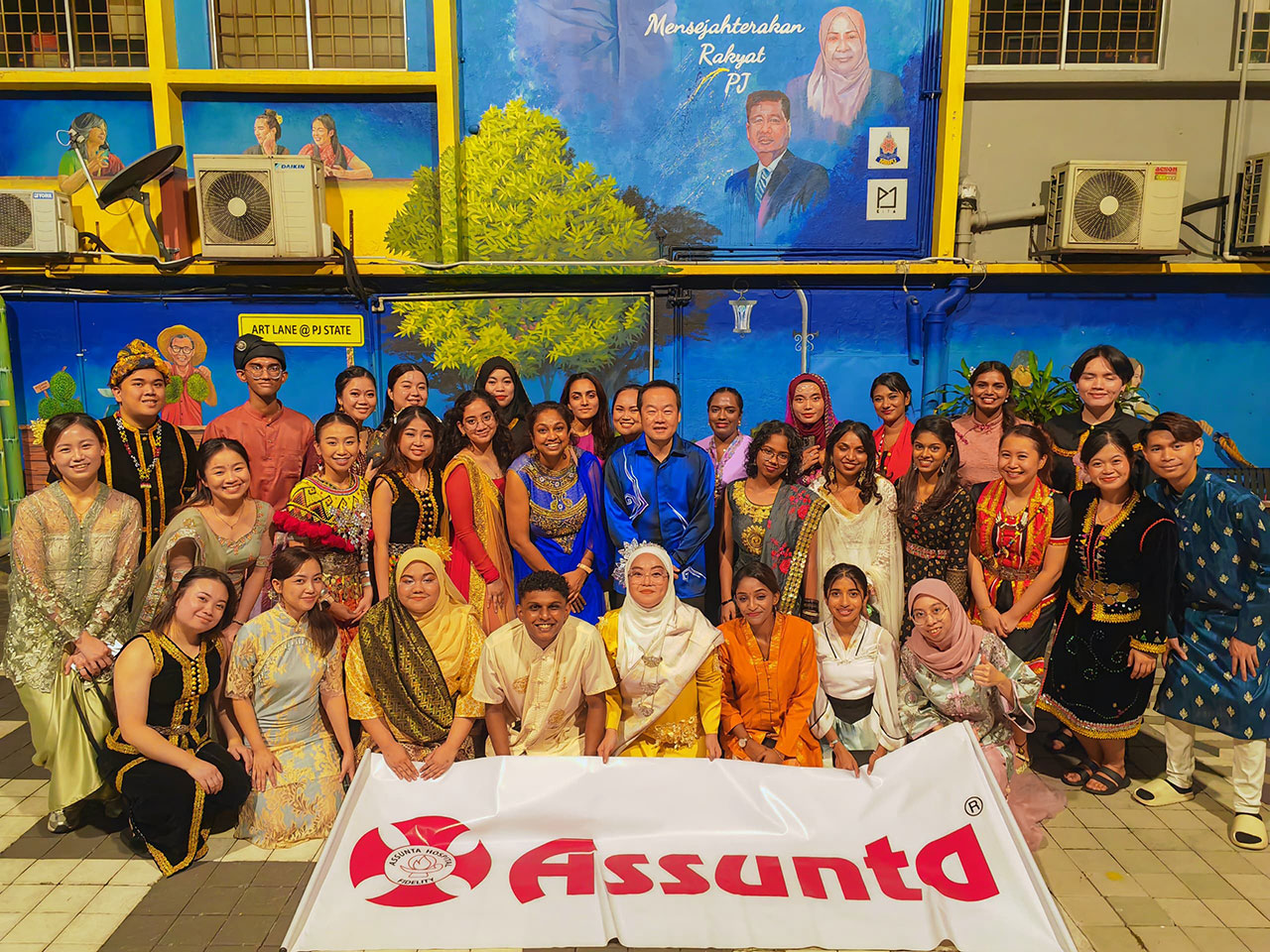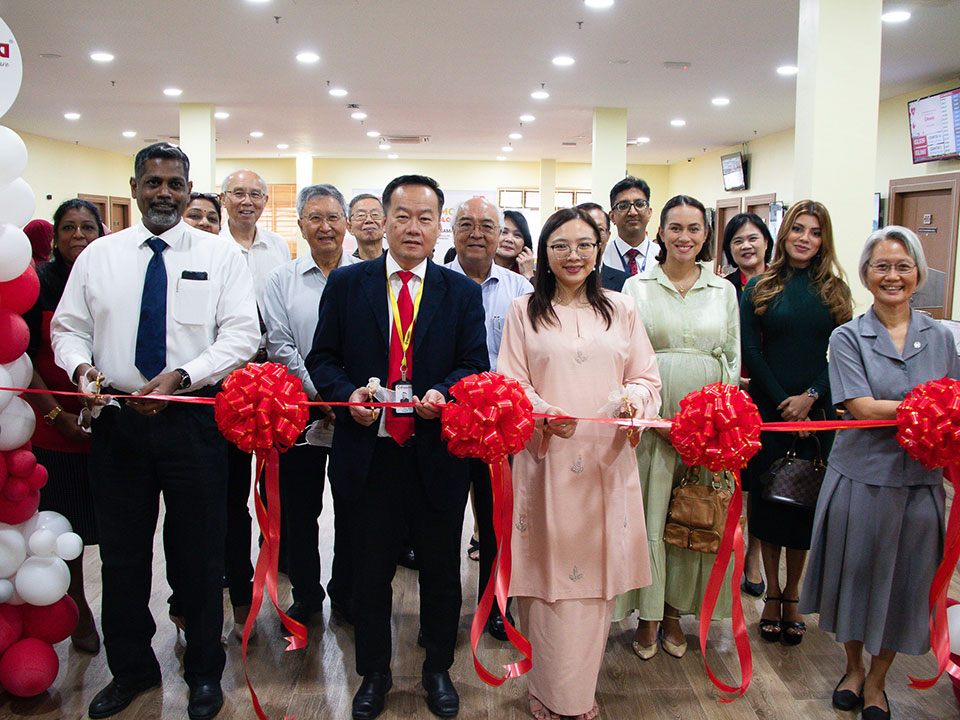Angels of mercy: These nurses are on the move to lend a helping hand!
- Updated on: July 27, 2023
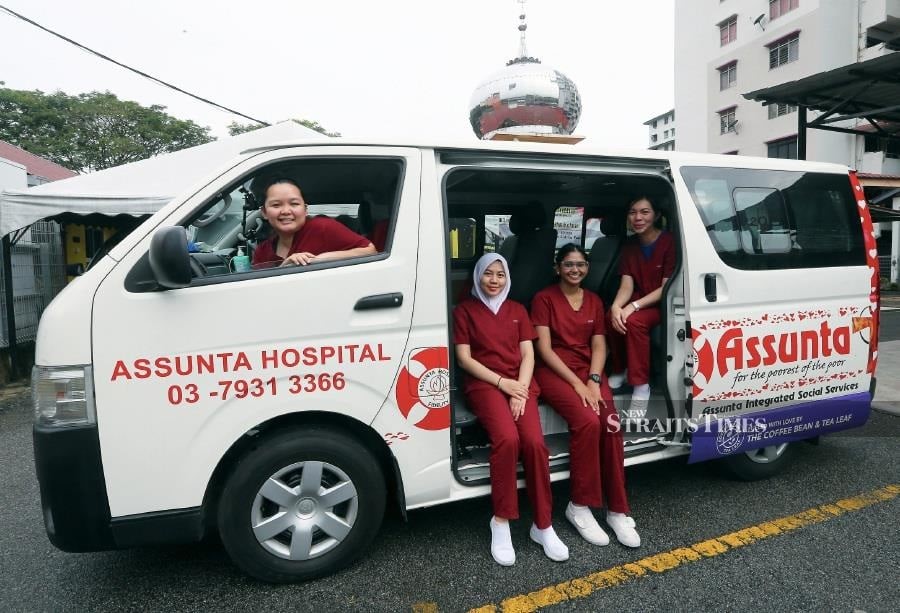
THE white van with the words ASSISS clearly emblazoned on the side sidles to a stop in front of a green building in the early hours of the morning. Despite the heavy traffic outside where honking cars are backed up on the narrow road surrounded by PPR (People’s Housing Projects) flats all around, there’s an air of stillness in the compound of the Surau Ar Ridhuan in Puchong.
The quietness is broken by laughter and quiet chatter as four young women emerge from the van, carrying boxes of medicines into the small hall next to the prayer hall.
The mobile clinic is a well-organised and compact unit, designed to be versatile and easily set up in various locations. It’s equipped with medical equipment and supplies to cater to the healthcare needs of the community.
As they start unloading their equipment, the nurses work together seamlessly, each with their specific tasks, showcasing a sense of unity and purpose. Just next to the hall, a group of women are seated in a circle with their Quran opened as they recite holy verses in unison. Their gentle voices echo through the hall where these young women are busy setting up their makeshift clinic.
To show respect for the women gathered next door, the nurses ensure that their setup process is conducted with utmost care and sensitivity. They communicate in hushed tones, mindful of the prayer hall’s proximity, and make minimal noise to avoid creating any disruption.

The gentle rustling of medical supplies being unpacked is barely audible against the backdrop of the melodic and calming Quranic recitations wafting in from the prayer hall.
Today, this will be a place of healing, where the sick can seek treatment and have access to medicines for free.
For these “mobile” nurses of Assunta Integrated Social Services (ASSISS), creating a safe space where fears can be expressed, concerns can be shared and vulnerability can find solace are imperative. Here, the poorest of the poor are welcomed and treated with dignity.

Just before the clinic starts, one of the community representatives beckons the nurses to a table on the far corner of the room. “Makanlah!” the elderly lady in tudung coaxes.
On the table, there’s packets of mee, and plates of kuih laid out for breakfast. It’s a touching token of gratitude rendered by the community for the outreach team. In the meantime, nurses Puvaanesiwary Veloo, Nureen Syauqina Haniff and Tiffany Chen Kah Lim wait patiently.
The modest mobile clinic is now open for business. Soon, there’ll be people walking through the doors seeking treatment and hope from these young women serving on the frontlines.
HISTORY OF SERVING

The heartbeat of Assunta Hospital and its charity arm ASSISS has always been serving the underprivileged. “In fact, ASSISS existed even before the hospital was built. Assunta was first a charity organisation before it evolved to become a hospital,” points out Dr Darshinia Ballasingam, head of medical services — ASSISS.
In 1954, two nuns from the Franciscan Missionaries of Mary (FMM) took their bicycles and went from home to home, offering medical services to the poorest of poor in Petaling Jaya.
As the need for medical services grew even more urgent, the nuns started a small clinic called Ave Maria at Section 1 to serve the underprivileged. Through public donations, the little clinic soon expanded to include a maternity home and convent.
As the year 1957 dawned, Petaling Jaya’s population surged exponentially, surpassing the capabilities of the clinic-maternity home. Driven by the visionary philanthropist, the late Tun Leong Yew Koh, an ambitious fundraising campaign was orchestrated.
This endeavour successfully garnered the necessary funds to construct the present-day hospital in 1959, securing a vital healthcare asset for the burgeoning community.
The hospital remains a not-for-profit establishment where 50 per cent of the profits are reinvested back into the hospital’s expansion, investment in new equipment and technology and to cover the operation costs. The remaining half is channelled into ASSISS to provide medical care and give support to the poorest of the poor, who are often neglected and abandoned.

According to Dr Darshinia, ASSISS offers a whole range of complementary services for the underprivileged, including pastoral care, mobile clinic, social welfare outpatient programme, wound care, palliative care and ASSISS stroke ancillary programme.
Patients with a combined family income of less than RM2,500 per month can access ASSISS’ integrated healthcare services at no charge, which includes consultation, treatment, surgery, primary medical monitoring, health promotion, geriatric care, education, wound care, end-of-life care and emotional support.
“ASSISS serves Klang Valley, Negeri Sembilan, Sabah and Sarawak. But we’re planning to expand our services to the rest of the states,” says Dr Darshinia.
According to her, ASSISS collaborates with the Welfare Department to identify the urban and rural poor, and once they fit the criteria of being in the B40 category and after a financial assessment is carried out, ASSISS would then treat these people with the necessary medical care.
“Our mission is to help the poor,” she says quietly, adding: “It’s the same mission the nuns had when they first started the medical outreach. Our mission has remained unchanged ever since.”
ENTER THE PEOPLE

It’s about nine in the morning when an elderly Indian man walks into the hall. The nurses immediately spring to action. From taking his information down to checking his weight and listening to his concerns before sending him to the volunteer doctor at the site, a simple triage has been set up to ensure smoothness of service.
Nurse Puvaanesiwary speaks to the man in fluent Tamil, her brows furrowed as she listens intently. He raises his arm and shows her where he’s hurting. She nods sympathetically.
The hall is soon filled with people. The Quran class next door has concluded and now the ladies are patiently seated, waiting to be called so the nurses could attend to them. The air is filled with the hum of conversation, the laughter of children and gentle murmurs of reassurance from the nurses.

With unwavering patience, the nurses engage with every patient, their warm smiles and comforting presence setting the tone for the entire experience. They take the time to listen attentively, acknowledging not just the physical ailments, but also the emotional burdens that accompany them.
In a private corner, Nurse Nureen sits with an elderly woman, carefully explaining her medication regimen and patiently addressing her concerns.
Despite the constant flow of patients, the nurses never rush. Their dedication to each individual is unwavering as they take the time to educate and empower patients to manage their health beyond the clinic’s walls.

“We just want to help as many people as possible,” says 24-year-old Puvaanesiwary with a smile. The nurse, who graduated nursing school in 2021, confesses that her biggest challenge is the language barrier.
“Some of our patients sometimes can’t speak English or Malay. But we try to understand them as much as we can. The residents themselves would try to help interpret!”
The challenges, she goes on to share, are what keeps them on their toes and help them grow both professionally and personally. “Every day brings something new — from adapting to different environments to finding solutions… It’s nothing like what I’ve learnt at nursing school, but it’s so rewarding!” she continues, laughing.
As the day progresses, a sense of camaraderie develops among the women gathered there. They exchange stories and support one another, forging bonds that transcend the temporary meeting within the mobile clinic’s walls. The atmosphere becomes one of a caring community, united in their pursuit of better health.
HELPING THE POOR

But the pursuit of better health can be a challenge among the poor. In the heart of Malaysia’s bustling urban centres, a silent crisis perpetuates the plight of the marginalised.
Among the most pressing challenges faced by the poor and urban poor is the ever-widening chasm that separates them from adequate healthcare access.
From financial woes to an already overcrowded public healthcare system, the B40 communities find themselves having little access to basic healthcare. “This is where we come in,” points out Dr Darshinia, and she has stories to prove how ASSISS can make a difference.
A 57-year-old woman, recalls Darshinia, with venous ulcers throughout her shins and calves of both legs, was referred to ASSISS by one of the government hospitals in the Klang Valley. “She had been suffering in pain for seven years and couldn’t walk at all. Doctors had seen her and treated her, but it wasn’t successful because there wasn’t adequate follow-up,” she explains.
It was a vicious cycle. The woman would get treated and then fail to go for a follow-up visit because she had literally no one to help take her to the nearby Klinik Kesihatan (Health Clinic) or hospital.
“The ulcers would return and it would get worse before she’d manage to get to the doctor again. It was sad because she had no family to look out for her. We were glad that when we received this particularly case, she wasn’t in a state where we couldn’t help,” says Dr Darshinia.
The woman was eventually given all the necessary treatment and follow-up by ASSISS. “Today, she can walk and she’s completely healed. But it got me thinking…” she sighs, adding: “If you’re alone and poor, the reality is nobody would think of you.”
ASSISS, she emphasises, wants to change that. And these nurses of the ASSISS mobile clinic are in fact, one of the many agents (or angels, as most poor communities would call them) of that change.

For Tiffany, her heart breaks when she encounters the elderly who are living alone. “It’s hard to see them living alone without family,” she says quietly, adding: “We try to talk to the representatives of the community to see if they could help check on these people and ensure that they’re not left on their own. It can be heartbreaking to see them fending for themselves.”
She recalls the time when they were already closing the clinic and packing up their medications one day, when an old lady with a walking stick slowly approached them. “Usually, we don’t accept patients when we’re packing up, but when I saw this aunty, I felt so kesian (sorry),” recounts Tiffany.
When Tiffany approached her and asked her gently what she needed, the woman told her that she had a very painful wound on her leg. The young nurse immediately gently dressed the wound and brought her to the doctor who tended to the elderly woman. “It may have been just small thing, but I know it made a world of difference to that aunty,” the 25-year-old adds softly.

A day at work could mean being on her feet more than 10 hours at a stretch, confesses 23-year-old Nureen. Like Puvaanesiwary and Tiffany, her job includes dealing with patients living in the outskirts of Selangor, seeing to those who need basic medical care, which includes monitoring their diabetes or hypertension. “We do what we can,” she says simply, shrugging her shoulders.
“Doing what we can,” has been ASSISS clarion call through the years. From the nuns who cycled through poor neighbourhoods tending to the sick and the needy back in 1954, to the nurses who travel in a white van to poor neighbourhoods to reach out to the sick and the needy, the work goes on. To date, about 38,954 individuals have been helped under the ASSISS programme.
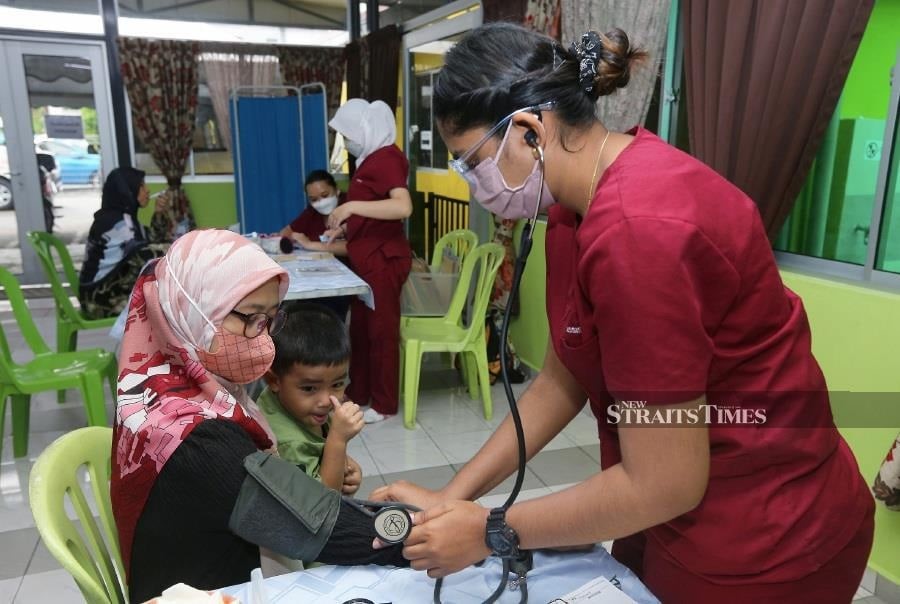
“What we’re doing may not be big, but I can’t imagine society without community services,” says Dr Darshinia quietly. “… because this is where real life starts.”
For many of us — for most of us — our situations are entirely accidents of birth, she points out. We were born into wealth or we were born into poverty or we were born somewhere in between.
“If we’re poor, we can hope that our fellow citizens will help us,” she concludes, adding: “That’s what we’re doing. We’re helping to make a difference.”
For further details on ASSISS, go to www.assunta.com.my/assiss.
Article Source: https://www.nst.com.my/lifestyle/sunday-vibes/2023/07/933902/angels-mercy-these-nurses-are-move-lend-helping-hand
Related Articles
